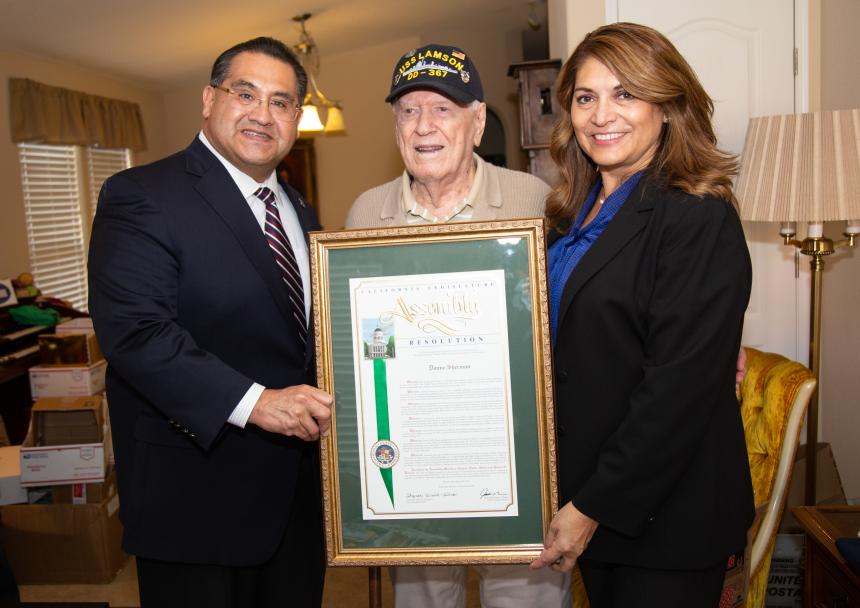Quirk-Silva Honors World War II Veteran Duane Sherman for his 96th Birthday

Mr. Sherman is a Purple Heart recipient and joined the Navy in 1942 after the attack on Pearl Harbor. He served on the USS Lamson Destroyer DD367 for 3.5 years fighting in the Phillipines at the Battle of Ormok Bay and Leyte Gulf. On December 7, 1944, his ship was hit by a kamikaze plane and received a Purple Heart for his heroism during the Battle of Leyte Gulf. He still carries shrapnel in his back from when he was hit as he jumped into the Pacific. Duane Sherman continued his service as a SONAR instructor for the Navy during the Korean War.
SACRAMENTO â Moments ago, Governor Gavin Newsom released his 2019-20 Budget Plan which proposes to fully fund two years of free community college in California at a cost of $40 million. These funds were proposed in the 2019-20 state budget, from the $200 million voter-approved Proposition 98 General Fund. This proposal extends the California College Promise to waive enrollment fees for first-time, full-time students for a second academic year.
Assembly Bill 2 (AB 2), jointly authored by Assemblymembers Sharon Quirk-Silva, Miguel Santiago, David Chiu, Kevin McCarty, Rob Bonta, Laura Freidman, Lorena Gonzalez, and Sabrina Cervantes was introduced to strengthen the California College Promise policy. This budget proposal takes an important step towards guaranteeing a completely free community college experience for California students.
âWe must be sure that Californiaâs students have access to higher education, yet high tuition costs deny students and their families the dream of obtaining a degree,â said Assemblywoman Sharon Quirk-Silva (D â Orange County). âExpanding the College Promise Program will give working class students, and their families, assurance that the cost of higher education, and the American Dream, will be within their reach. A reinvestment in our students is an investment in California; its educated students, skilled workforce, economy, and its future.â
SACRAMENTO - California State Assemblywoman Sharon Quirk-Silva is pleased to announce the committees that she is assigned to for the 2019-20 legislative session. The reelected Assemblywoman has been assigned to the following high-profile committees by the Speaker of the State Assembly, to address the needs of the State of California: Housing and Community Development, Accountability and Administrative Review, Communications and Conveyance, Governmental Organization, and the Assembly Committee on Rules.
The jurisdiction of the Housing and Community Development Committee includes building standards, common interest developments, eminent domain, farm worker housing, homeless programs, housing discrimination, housing finance (including redevelopment), housing, natural disaster assistance and preparedness, land use planning, mobile homes/manufactured housing,
redevelopment: housing, and rent control.
âI am honored that Assembly Speaker Anthony Rendon has placed the confidence in me to be involved in these critical policy-making committees that will greatly impact our state,â said Quirk-Silva. âIn particular, the Housing Committee is the front line in finding and building constructive solutions for the affordable housing crisis, and homelessness, in our state. I am proud to help lead the focus of this important committee in the years to come, especially for the people of Orange County.â
Assemblywoman Quirk-Silva has met with U.S. District Court Judge David O. Carter, state leaders, and local officials of the county and city level over the past years. Quirk-Silva has also taken the time to tour encampments, and talk one-on-one with the homeless advocates in Orange County.
âI have focused a great deal of my attention on thoughtful and necessary mediation between state and local officials, authored legislation (Assembly Bill 448) to establish an agency consisting of local, concerned entities to provide construction of supportive housing units, and brought millions of dollars in funding to shelters in Orange County, â said Quirk-Silva. âI will continue to push the state to do more for its people, and the housing needs of our communities.â
ORANGE COUNTY â Hundreds of new laws took effect in California on New Yearâs Day, bringing protections and regulations to many issue areas, from addressing some of the stateâs educational needs and mental health to election reform and net neutrality. Here is a quick rundown of just some of the important, noteworthy laws that took effect, which Assemblywoman Quirk-Silva worked on and supported within the California State Legislature.
Top Legislative Priorities Include: Addressing Homelessness, Affordable Housing, Affordable Higher Education, Health, and Public Safety

(Assemblywoman Quirk-Silva recites oath of office with husband, Mayor Jesus Silva)
BUENA PARK â Last night, Sharon Quirk-Silva (D â Orange County) was sworn-in during her Holiday Celebration and Toy Drive in her district office. The ceremony included a community oath to serve as California Assemblymember for 2019 to 2020 for the 65th district. Quirk-Silva, who served as the 65thâs Assemblywoman from 2012 to 2014, was elected again to serve from 2016 to 2018 and then reelected this year to serve the 2019 to 2020 legislative term. The 65th Assembly District incorporates Orange County communities in Anaheim, Buena Park, Cypress, Fullerton, La Palma, Garden Grove, and Stanton.
âI am grateful, and honored, for the opportunity to continue to serve the residents of the 65th District as their State Assemblywoman,â said Quirk-Silva. âI want to thank my constituents for their trust and support. I will continue the work in bringing the state of Californiaâs resources to the people of Orange County.â
FULLERTON, CAâ Assemblywoman Sharon Quirk-Silva released the following response to the Department of Homeland Security (DHS) reportedly meeting with Vietnamese government officials this week to discuss drastic changes to the terms of an agreement that has governed the deportation of individuals to Vietnam since 2008. Quirk-Silva joins many families in Orange County in opposing any changes to the agreement that would erode protections currently afforded to Vietnamese immigrants, including a provision that does not permit those who entered the United States before July 12, 1995 to be deported.
âI want to express my concern over the latest actions of the Trump administration this week. Any actions that prioritize harsher restrictions such as these should be made with a diplomatic, and more level-headed approach,â said Assemblywoman Quirk-Silva. âSoutheast Asian Communities, including Vietnamese communities, and all the proud Asian Pacific Islander communities of Orange County should not be made to fear being arrested and deported. The refugee story in Orange County is proof that the American Dream is alive and well. People fleeing their home only for their safety, and the safety of their children, should be respected and not feared.â
Modifications to the U.S. - Vietnam Repatriation Agreement could potentially make over 8,500 individuals immediately vulnerable to deportation. Many of these community members came to the United States as refugees, fleeing war and persecution, and have lived here peacefully for decades.
Top Legislative Priorities Include: Addressing Homelessness, Affordable Housing, Affordable Higher Education, Health, and Public Safety
SACRAMENTO â This morning, Sharon Quirk-Silva (D â Orange County) was sworn-in to serve as California Assemblymember for 2019 to 2020. Quirk-Silva, who served as the 65thâs Assemblywoman from 2012 to 2014, was elected again to serve from 2016 to 2018 and then reelected this year to serve the 2019 to 2020 legislative term. The 65th Assembly District incorporates Orange County communities in Anaheim, Buena Park, Cypress, Fullerton, La Palma, Garden Grove, and Stanton.
âI am grateful, and honored, for the opportunity to continue to serve the residents of the 65th District as their State Assemblywoman,â said Quirk-Silva. âI want to thank my constituents for their trust and support. I will continue the work in bringing the state of Californiaâs resources to the people of Orange County.â
The reelected Assemblywoman has already been hard at work to craft sensible legislation for the upcoming 2-year session, which aims to help her Orange County district.
âThere is a serious need to address homelessness, affordable housing, and affordable higher education. I will also focus my legislative work on public safety, access to mental and behavioral health care, and our small businesses. I will continue to fight for our communities, and make sure that the state is being held accountable for the people of Orange County,â said Quirk-Silva.
Assemblywoman Quirk-Silva is a mother, educator, and dedicated public servant who has served her community as Mayor of Fullerton, and in the State Assembly. Quirk-Silva grew up in Orange County and received her education at Fullerton public schools, Fullerton College, before earning her bachelorâs degree at UCLA and her Teaching Credential from CSU Fullerton.
Assemblywoman Quirk-Silva will also be hosting a Holiday Celebration and Toy Drive that will feature a âcommunity swearing-inâ on Thursday, December 20, and the district office will be available to discuss legislative issues of interest to the community, and the services provided by state.
SACRAMENTO â California Assemblywoman Sharon Quirk-Silva (D â Orange County) released the following statement in response to the 13 people killed (including the shooter and a Ventura County Sheriffâs deputy) after a shooting last night at Thousand Oaksâ Borderline Bar & Grill. Sergeant Ron Helus of the Ventura County Sheriff's Office, a 29-year veteran, was critically injured, and succumbed to his injuries. Approximately 21 people were injured and treated at area hospitals.
âI join a world in mourning today, with a broken heart. It is the time for prayer, and it is the time for change. We must do everything possible to stop these seemingly constant tragedies,â said Assemblywoman Quirk-Silva. âHow we respond to tragedy is a true hallmark of integrity. People from the local community, the state of California, and the nation are reacting to the tragedy by opening their hearts and supporting the victims. I encourage everyone mourning the horrific circumstances to act as well, by donating what they can.â
For people wishing to donate funds, authorities are accepting donations for victims through the Ventura County Community Foundation. 100 percent of the funds collected will go directly to provide assistance to the victims and their families.
SACRAMENTO â California Assemblywoman Sharon Quirk-Silva (D â Orange County) released the following statement in response to the 11 people killed in the Tree of Life Congregation Synagogue Pittsburgh on Saturday. The victims of the attack were beloved members of one of the countryâs vital Jewish communities. The perpetrator of this brutal act made hate-filled statements during the shooting, and targeted Jews on social media, according to a federal law enforcement official.
âOrange County stands together with the rest of America in support of the Jewish community of Pittsburgh. Our hearts are with the Tree of Life community, the first responders, and the families that suffered their tragic loss,â said Quirk-Silva. âIn the face of this horrendous, hate-driven, and anti-Semitic brutality, we must reject intolerance and remember that inclusion is what makes a community strong. These attacks should be seen as attacks on the very foundation this country stands for.â
In lieu of the tragedy, Assemblywoman Quirk-Silva will continue to work closely with legislative leaders, as well as relevant standing policy committees, concerned residents, and other officials to examine solutions to violent hate crimes that continue to plague communities around the state and the country.